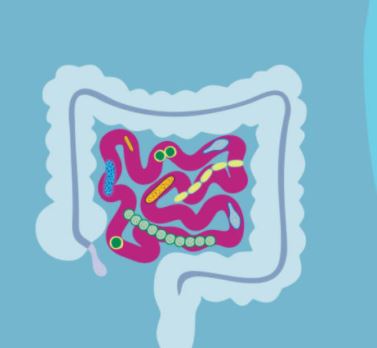
The overgrowth of bacteria in the small intestine, SIBO, leads injury to the small intestinal microvilli. The small intestine and microvilli are essential in digestion and absorption of many nutrients and any damage then contributes to poor absorption and as a result multiple nutritional deficiencies. This is then likely to contribute to a viscous cycle of increased inflammation and oxidation linked with poor nutrition and even more gut damage.
While most people would love the idea of losing any weight, weight loss can be a serious side effect of SIBO due to poor absorption of fats, carbohydrates and proteins. This is often compounded, especially in the elderly by the discomfort caused by eating and as a result avoiding eating and meals.
Carbohydrate malabsorption can result from SIBO due to reduced effectiveness of the enzymes to digest carbohydrate (reduced disaccharidase function). Fat malabsorption (Steatorrhoea) and as a result, low levels of fat soluble nutrients may result from SIBO including vitamin D deficiency leading to osteomalacia (softening of the bones). While vitamin E deficiency syndromes have been reported in a number of studies on SIBO patients.
Protein deficiencies have also been identified due to the diversion of dietary nitrogen into urea formation by the bacteria overgrowth, with the result that it becomes unavailable for protein digestion. Unfortunately then, these proteins which are used for so many purposes around the body from neurotransmitter and your immune system to repair can no longer do their good work. Some of the bacteria also use vitamins like B12 and B6 and reduce the absorption of vitamin B12 absorption which make them unavailable for us. You can see how this is getting pretty bad.
SIBO has also been associated with mineral deficiencies especially iron and calcium. Iron deficiency anemia can occur in SIBO and low calcium, hypocalcaemia and osteoporosis is a recognised complication of SIBO. In one study bone loss at both lumbar (lower back) and femoral (thigh bone) levels was higher in SIBO patient group than in healthy volunteers. The severity of bone loss was also related to poor nutritional status and how long they had suffered malabsorption symptoms. The longer they had malabsorption symptoms the greater the bone loss.
One of the first steps while reversing SIBO is to pay particular attention to improving your personal nutrition and nutritional status.
If you are serious about fixing your SIBO our 4 part SIBO Solution Masterclass is now available for $55 or in our membership program for $75.
References
Int J Mol Sci . 2020 May 16;21(10):3531. doi: 10.3390/ijms21103531. The Influence of Small Intestinal Bacterial Overgrowth in Digestive and Extra-Intestinal Disorders Giuseppe Losurdo 1 2 , Fulvio Salvatore D’Abramo 1 , Giuseppe Indellicati 1 , Chiara Lillo 1 , Enzo Ierardi 1 , Alfredo Di Leo 1 PMCID: PMC7279035 DOI: 10.3390/ijms21103531
Dig Dis Sci . 2001 May;46(5):1077-82. doi: 10.1023/a:1010722314493. Small Intestine Bacterial Overgrowth and Metabolic Bone Disease M Di Stefano 1 , G Veneto, S Malservisi, G R Corazza DOI: 10.1023/a:1010722314493
Nutr Rev. 2003 Apr;61(4):132-5. doi: 10.1301/nr.2003.apr.132-135. Small Intestinal Bacterial Overgrowth: A Possible Risk Factor for Metabolic Bone Disease Abhinandana Anantharaju 1 , Michael Klamut DOI: 10.1301/nr.2003.apr.132-135